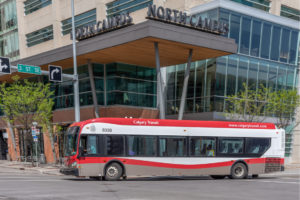The $491 million to purchase 259 electric buses for Calgary’s transit fleet will come from loans from the Canadian Infrastructure Bank, a grant from Infrastructure Canada and money approved by city council

Calgary’s city council is moving forward with a recommendation to secure a $168-million loan from the Canadian Infrastructure Bank (CIB) to help fund the purchase of up to 259 40-foot electric buses for the city’s transit fleet.
The $491 million to purchase 259 electric buses for Calgary’s transit fleet will come from loans from the Canadian Infrastructure Bank, a grant from Infrastructure Canada and money approved by city council
Calgary City Council is moving forward with a recommendation to secure a $168-million loan from the Canadian Infrastructure Bank (CIB) to help fund the purchase of up to 259 40-foot electric buses for the city’s transit fleet.
During the executive committee meeting held on Tuesday, city administrators emphasized that there is a short window of opportunity to sign definitive agreements before the start of 2023 with the CIB in order to benefit from the current ultra-low one per cent interest rate on the loan.
The total cost of procuring the electric buses and supporting charging infrastructure will be $491 million, estimates the city. During the meeting, Mayor Jyoti Gondek (a proponent of EVs) called the proposal, a “great opportunity.”
“I think this really demonstrates that if we’re willing to put up some funding…$100 million to be able to draw almost $400 million is a big deal.”
In conjunction with the loan, a $223 million grant is also available through Infrastructure Canada’s Zero Emission Transit Fund (ZETF). And the remaining $100 million — roughly the amount set aside by the council to cover the lifecycle cost of operating a diesel-powered fleet of transit buses — will have to be financed by the city.
The city is planning to pay off the debt from the loan through the anticipated savings from operating EVs in the city fleet and transitioning away from diesel.
Diversifying the fleet, strengthening the grid
Currently, Calgary’s transit fleet includes 140 compressed natural gas buses out of a total of 750, 40-foot buses. Thirty-two additional CNG buses will be added by the end of the year. The city also has 93 60-foot diesel buses.
Councillor Jasmine Mian asked city staff if the ultimate goal would be to eventually move away from diesel and compressed natural gas and towards electrifying the entire transit service’s fleet.
The city says it’s open to adopting any range of zero-emission technology that is low-cost and will be suitable for its operations and Calgary’s climate.
“Electrifying a portion of our fleet is a step in going towards zero-emission, but there are also other opportunities that are emerging right now that we would like to investigate further before we fully commit to going 100 per cent electric,” said Karen Alm, manager of Calgary Transit service vehicles. “One of those opportunities is hydrogen fuel cell buses, which would also allow us to have zero emissions for those vehicles.”
Mayor Gondek agreed that having a diversified fleet with electricity, compressed natural gas and, eventually, hydrogen will be “incredibly important” for the city, while also stressing the need to make sure the city infrastructure can support the various energy sources required for the different buses.
“As a council, we’re going to have to be very diligent about asking for a better grid. If we are going to electrify our fleets, if we are going to look at cleaner energy solutions; we’re going to have to advocate with many other partners — to our provincial regulators — to make sure that the grid is not as dated as it is presently.”
More emissions-saving data needed
Councillor Richard Pootmans was also in favour of the proposal, but added that going forward he wants to see more metrics on the cost-effectiveness of the project and what the anticipated emission savings will be.
“I would like to see some way of measuring the benefits of this project against a perhaps commercial building and retrofits to save energy,” says Pootmans. “We’re kind of punching in the dark in my opinion and I’d like a little more clarity about why this [project] emerges.”
Calgary city administrators confirmed they are aiming to submit a report with full details on the environmental benefits of purchasing the fleet of electric buses and how the project aligns with the city’s overall climate strategy by December.
At that point council will be asked to give final approval on the credited loan. After that, city staff will submit the application for the grant money with a decision expected by the second quarter of 2023.
Assuming the rest of the process goes smoothly, Calgary’s fleet of new electric buses will be put in service by 2026.












